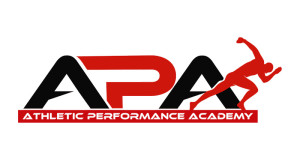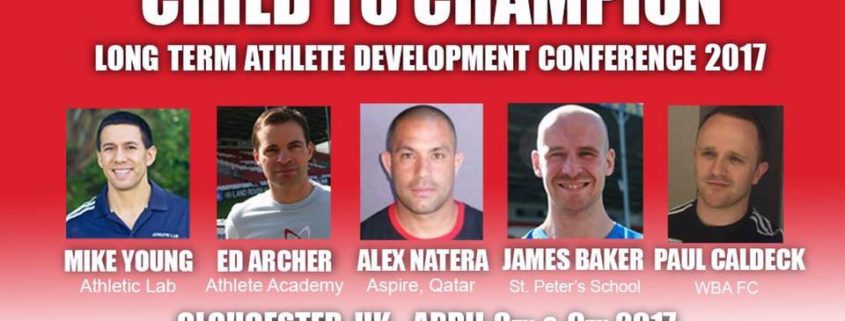Child to Champion 2017 Conference Review
Last weekend, I attended the Child to Champion LTAD conference in Gloucester. It was hosted by ProFormance which is run in the UK by James Baker & in the US by Mike Young. For those of you who couldn’t make it please find below a few bullet-point notes from the sessions I attended. I will go on record and say this is probably the best conference I have attended. Every presentation was insightful and I took something away from every single one!
And as a special bonus I have also included a review from my colleague in British Tennis Arran Peck who attended the inaugural conference in 2016!!
2017
First of all shout out to Andy Bruce who did a cool conference review with a summary of the twitter feed that was blowing up on the day #childtochampion
You can see his review HERE
Here are my top take home messages from a few of the 16 presentations that I heard throughout the weekend.
Pre Conference Friday April 7th
Dr. Mike Young – Owner & founder of Athletic Lab Sports Performance Training Center – ‘Means and Methods of Eccentric training’
- Eccentric training increases concentric strength but concentric strength training does not increase eccentric strength levels
- An athlete’s ability to resist yielding is the key to athletic success
- We typically assess strength using concentric assessment such as 1-Repetition Maximums (RM). But the better question to ask is how strong someone is eccentrically
- Many methods to develop eccentric strength: Eccentric training- controlled descent with submax loads (@85%1RM) => Accentuated loading (110-120% 1RM) => Shock method (snatch balance) => Flywheel => Partial reps
Saturday April 8th
Alex Natera – Senior S&C coach at Aspire Academy, Qatar – ‘Strength and Power in the Elite Student Athlete’
- Relentless pursuit of maximal strength when you’re already strong may be a waste of time
- Advanced lifters can continue to get stronger by making skill development improvements rather than capacity improvements
- Use ‘link’ assessments to gauge transfer of strength- a loaded skill that is very similar to the sport skill i.e., timed prowler push for assessing strength gains in acceleration
- Single leg loaded squats can be a clever way to overload the system while using lower loads- keeps the technical coach happier nearer important competitions
- Eccentric training- use it or lose it. After 4 weeks it detrains so don’t assume sprinting will be sufficient to maintain the strength gains made in previous cycles- it won’t
Allan MacDonald – Senior S&C coach at British Judo – ‘The Psychological Characteristics of Developing Excellence’
- Reverse engineer the behaviours we want to see in our young athletes. Banning mobiles from the gym doesn’t the challenge self-awareness and self-regulation
- Trauma creates talent (psychologically)? Do you have to go through adversity to grow and learn to cope with stress? Trauma only helps if you can come out the other side i.e have the psychological tools
- Learn to reframe (before) – Positive self-talk (during) – Self reflect (after)
Matt Depledge – S&C coach at Southampton AFC– ‘The Application of Growth and Maturation in Academy Football
- Use Khamis & Roche (1994) Method to calculate Percentage of Predicted Adult Height (PAH)
- Use Mirwald (2002) Formula to calculate Maturity offset value
Paul Caldbeck – Senior S&C coach at West Bromwich Albion FC – ‘Carpe Diem- Are Academy Footballers Fit for Purpose’
- The stronger and fitter you are the faster you recover
- Pre-season versus In-season: Less High Intensity running volume and More lower intensity running
- For young players coming up into First team besides the overall higher training loads the biggest challenge is the speed of the game. It is faster and there is higher volume of sprinting
Sunday April 9th
Des Ryan – Head of Sport Science and Medicine, Arsenal AFC – ‘The Arsenal Physical Development Framework’
- Increase complexity of an exercise (as opposed to just adding load) when kids are going through peak height velocity
- FMS scores seem to stall during PHV but soon pick up afterwards
- FMS scores do not predict injuries but are important way to monitor quality of movement which is related to athletic performance. Better movers are better able to acquire more complex skills
Dr James McCarron – Head of Academy Performance, Sunderland AFC– ‘Implicit and Explicit Aspects of Athletic Development’
- Implicit and explicit both effective. Explicit learning seems to be more effective as athlete matures. Both can be periodised in training week and effective for athlete undergoing rehab to increase cognitive load when physical load is low.
Pete Atkinson – National Lead for S&C at England & Wales Cricket Board (ECB).– ‘An Insight to the ECB Pace Programme: Preparing the next generation of International Fast Bowlers’
- Player-led not programme-led strategy
- If we measure it- we report it!
- Bernstein’s (1967) theory of repetition without repetition- variability by another name!
2016
Dr Rhodri Lloyd – Senior Lecturer at Cardiff Met University – ‘Plyometric Training & the Young Athlete’
- Extensive evidence of increase in bone mass, bone mineral accrual & bone mineral density resulting from plyometric interventions BUT beware of intensity, volume & fatigue. Technical breakdown is most reliable ‘red-flag’
- Plyometric exercises play an important role in injury prevention and economy NOT JUST increased explosive qualities
- “We cannot always build the future for our youth, but we can build our youth for the future” (Franklin D Roosevelt, 1940)
Dr Mike Young – Founder of EliteTrack.com & owner of HPC Athletic Lab – ‘Best Practises For Developing Speed Across the Developmental Continuum’
- Speed has both mechanical & physical constraints: <MASS + >FORCE + <TIME + right direction = RUN FASTER
- You need a functioning athlete before you equip them to run ‘insanely’ fast – design, build, optimize and only THEN maximise!!!
- Reduced total VOLUME, increased rep DISTANCE and increased REST between reps as athlete gets better / faster
Dr Neil Potts – Head of Athletic Performance at Scottish Rugby – ‘Building & Implementing A System To Produce International Rugby Players’
- Focus on the CONTROLLABLES and maximise the ‘bang for your buck’
- Do the simple things VERY well & create a legacy that survives you in the role
- Develop an EXCELLENCE culture in particular self-reliance, professional standards & continual evolution
Dr Ian Jeffries – Director of Athletic Performance at Powys Sports Academy, Wales – ‘Effective movement in sport’
- Why tunnel athletic development with the use of ‘Long term’??? Need to see change now, not at some far away point in the future
- Beware the EXECUTION gap (there are too many models and not enough action) as well as the “perilous allure of the new!!!”
- Start with the sport & / or a skill and identify opportunities to improve it
Shane Murphy – U21’s Sports Scientist, Manchester City FC – ‘Peak Height Velocity & Injury’
- Weekly player ‘case conferences’ scheduled to discuss player attitude, development & performance
- Normal, modified and restricted training resulting from Training Load monitoring
- Strong advocates of ‘alternate’ and ‘education’ sessions throughout Academy week & season
Kevin Paxton – Head of Academy Sports Science, Leicester City FC – ‘Age-Related Performance Benchmarking’
- Importance of good recruitment – need staff who are good TEACHERS & want to work with young players
- Data collected must inform practice & improve performance otherwise irrelevant
- SIMPLIFY your plans and programmes otherwise trainers, coaches and players won’t stick to them
In closing, it is important to note that the whole weekend was well organised, everyone was extremely generous with their time, experiences and intellectual property and the delegate cost was very reasonable. I would definitely recommend you follow both James and Mike on Twitter for discussions and updates on the subject of LTAD and would encourage you to book onto the 2018 conference as and if one is proposed. Please do not hesitate to contact me if you require any clarifications on the comments above or have any questions about.



